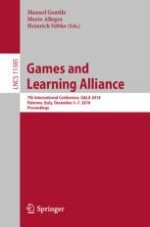2019 | OriginalPaper | Buchkapitel
Board Games for Training Computational Thinking
verfasst von : Katerina Tsarava, Korbinian Moeller, Manuel Ninaus
Erschienen in: Games and Learning Alliance
Aktivieren Sie unsere intelligente Suche, um passende Fachinhalte oder Patente zu finden.
Wählen Sie Textabschnitte aus um mit Künstlicher Intelligenz passenden Patente zu finden. powered by
Markieren Sie Textabschnitte, um KI-gestützt weitere passende Inhalte zu finden. powered by
